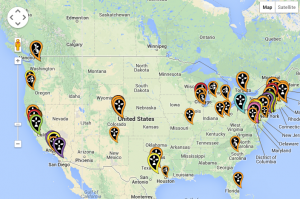Food Justice Subscribe
A selection of initiatives, blogs, resources and communities on Jewcology which focus on food justice.
From the Blogs
Earth Etude for Elul 17- Meditation on Elul
by Richard H. Schwartz Elul is here. It represents a chance for heightened introspection, an opportunity to do teshuva and improve our lives, before the “Days of Awe,” the days of judgment, the “High holidays” of Rosh Hashanah and Yom Kippur. The shofar is blown every morning (except on Shabbat) in synagogues during the month of Elul to awaken us from slumber, to remind us to consider where we are in our lives and to urge us to make positive changes. How should we respond to Elul today? How should we respond when we hear reports almost ...
Earth Etude for Elul 16- The Compost Bin in Our Hearts
by Rabbi Katy Z. Allen My compost bins are so much more than just a place where compost happens. The area beside the three wire and wood bins is place where I often feel my father’s spirit – he was raised on a farm, and though he became a professional, gardening was in his blood, and he spent much of his spare time in his garden and his orchard. Yet, it is not just the reminders of my father or the sense of his hovering spirit that gives meaning to my compost bins. They are symbolic of so much – which may be more the truer reason that I think ...
Earth Etude 15- Looking at the Whole Picture
By Susie Davidson As a writaholic, I am also a readaholic. As we move forward in our chosen missions toward creating communities that feed, nurture and sustain (while protecting) all the inhabitants of the earth, I believe that it is also incumbent upon us to remain informed about the news of the day and the topics that affect underlying societal infrastructures. Certainly, some of these infrastructures seem entrenched to the point of impermeability, none more so than the economic systems that govern world relations and, therefore, virtually every facet of ...
Earth Etude for Elul 14- Elul’s Comin”
by Judith Felsen In days of Av anticpatin’ I have done my exploration searching, seeking digging deeper all to clear the space as greeter. From the bottom of my looking I can sense great times are coming soon our King will sure arrive and in fields we both will thrive. Therefore now and always ever will this earth be seen as heaven by all those who now know its glitter shimmering sparks both there and hither. May we join in joyful meeting in all lands we’ve tilled this season. Welcome King, we greet your visit ...
Earth Etude 13- The Flood
by Rabbi Dorit Edut The meteorologists predicted a possible heavy rainstorm and suggested bringing an umbrella to work. But as I drove home from an interfaith conference, I got a call from my husband announcing: “ You’ll have to swim home – everything is flooded here.” My heart stopped beating for a minute when I heard this, realizing that all my rabbinic books and papers, many photograph albums including those from my parents’ lives in pre-Holocaust Europe, all our children’s albums and memorabilia, my father’s award-winning black and ...
Earth Etude for Elul 12- Growing Teshuva
by Maxine Lyons I am often looking for ways to connect to teshuvah even during the leisurely days of summer. Teshuvah for me is turning to those thoughts and actions that help me to become my better self, following those practices that nourish my growth to know peace - shalom - and to reach greater wholeness - sh'lemut. As I pursue personal growth, I resonate to the Hebrew word, hitpatchut, growth through an openness and receptivity to change.This summer I have focused on ways to practice with greater compassion in how I spend my time and focus my energy as I take on ...
Earth Etude for Elul 10- Topsy Turvy Bus
by Rabbi Margaret Frisch Klein The world seems a little topsy turvy these days. A plane missing. 223 girls kidnapped in Nigeria. 3 teen agers kidnapped and murdered in Israel. A plane shot out of the sky. Israel in Gaza. Rockets in Israel. Too many children killed in the streets of Chicago. Too many deaths. When does it stop? In the Fox River Valley, Illinois, after a punishing winter of epic proportions, it is nice to be outside. Six congregations, part of the nascent Prairie Jewish Coalition, sponsored the Topsy Turvy bus. What is a ...
Earth Etude for Elul 9 – A Cry in the Night: My Decision not to Consume Dairy
by Diana G. A memory: Our newborn is up again. I turn to the clock. It’s 4:25 am. Less than three hours since she last awoke. My husband and I are exhausted, and we lie quietly for a few moments, willing our daughter back to sleep. But her cries are persistent. Who knows if she’s hungry, cold, or simply distressed and looking for comfort? Regardless, we’ve reached our “give-her-a-moment” limit; there’s only so long one can ignore an infant baby’s cries. My husband grabs for his glasses, makes his way to the nursery, and returns ...
Earth Etude for Elul 8 – Waves on the Beach
by Rabbi Katy Z. Allen I stand on the beach. Waves-- I hear them, see them, rising, falling, splashing, foaming. Deep within me waves form, rise up, are released, unite with the ocean waves. Throughout my body sadness.... grief.... despair.... engulf me. The Earth is suffering. I cannot simply stand, sit, lie, relax. Act, I must, driven by my grief, by my love, by the waves, in order to live with myself, with the Holy One of Blessing-- who is able to quiet waves, in the sea, in my soul-- who continues ...
Greening Your High Holidays
Rosh Hashanah and Yom Kippur are right around the corner. There are a number of things you can do as a way to resolve to be more environmentally aware this new year. Use local and organic ingredients in your meals: The healthiest foods for the holiday are foods that are grown locally without any pesticides. Food purchased from local farmers or that you grow yourself will be fresher and have a higher nutritional content than food flown in from hundreds of miles or more away. If you are planning to serve the traditional snack of apples and honey, consider that ...
Earth Etude for Elul 7- Rosh Hashanah Shemittah Seder 5775
Created by Rabbi Nina Beth Cardin, to be shared, celebrated, and enjoyed Click here for a downloadable version to print out and use at your Rosh HaShanah dinner. Ever since the first breath of creation, time has unfolded in cycles of seven. Six days reach their crescendo in the seventh day, Shabbat - the Sabbath, the day of rest. Six years reach their crescendo in the seventh year, Shemittah - the sabbatical, the year of renewal. Seven cycles of seven years reach their crescendo in the Jubilee year, the ultimate enactment of re-creation. All ...
Living with Change
Earth Etude for Elul 6 by Rabbi Howard Cohen The end of the human race will be that it will eventually die of civilisation. Ralph Waldo Emerson With the approach of the season of Teshuvah it is once again time to reflect on our relationship with the earth. In the past I would have asked myself questions such as ‘did I waste natural resources’; or ‘did I pour unreasonable amounts of carbon into the atmospher’; or ‘did I speak out against corporate environmental abuse’. These questions are important but I believe that there is ...
Giving Yourself an Autumn Break
by Andrew Oram This time of year always seems a hurricane of activity: coming back from vacation to reams of email, or starting school, or dealing with all the pent-up housework that went blissfully ignored during the easy summer months. Traditionally, Jews see this time of year very differently. Like typical Americans, this period is for them both an ending and a beginning: a recognition of the waning of life and an invigorating harbinger of new possibilities. But in place of the chaotic hurricane that starts for us after Labor Day, many Jews launch a period of ...
Earth Etude for Elul 3 – Let it Rest
Earth Etude for Elul 3 - Let It Rest by Carol Reiman Let it rest-- the land that we have worked so hard, the grassy fare for geese now taken by the high tech labs, the water diverted far away to leave the old spot bare, the day diminished by our dense cramming, electronics robbing our eyes of moisture... Let it rest-- the fish sleep still near the bottom, the standing horse relaxes muscles, the cat stretches and curls... Let it rest-- the yawn exchanges stale air for fresh, cells grow, the blood flows with its passengers for new destinations, ...
Are There Special Foods to Welcome Shmita?
Rabbi Nina Beth Cardin has suggested that for the Erev Rosh Hashanah meal which this year, on Wednesday evening September 24, begins the Shmita Year of Shabbat Shabbaton, we have a seder plate, with seven items (marking the seven-ness of Shmita). What might these seven be? Already nominated: bread (like challah for Shabbat, should this be a “woven” bread? round, for the cycles, as is a traditional Rosh Hashanah challah? how about woven into seven spirals?), an apple, honey, wine, pomegranates. What might the others be, and ...
The Vegetarian Views of the Rav
Joseph Ber (Yosef Dov) Soloveitchik, affectionately known as the Rav (generally pronounced Ruv), was generally regarded as one of the leading philosophers, Talmudic scholars, and Jewish leaders of the 20th century. He stressed that Torah values were compatible with world culture and secular studies and promoted Jewish interaction with the broader community. The Rav was regarded as a seminal figure in the modern Orthodox community. Over a nearly 50-year career, he ordained almost 2,000 Orthodox rabbis, and served as a mentor, guide, and role model for tens of thousands ...
A Jewish Vegetarian Response to Efforts to Ban Shechita
As president emeritus of Jewish Vegetarians of North America, I would like to address the many recent efforts in several countries to ban shechita (Jewish ritual slaughter). First, although JVNA believes that every person should be a vegan and that there should be NO slaughter of animals at all, we also oppose efforts to single out shechita for special criticism. There are many factors in the shechita process designed to minimize pain. Animals are to be killed by a shochet (ritual slaughterer), a religious Jew who is especially trained and certified. He ideally ...
Frequently Asked Questions About Animal Sacrifices
1. If God wanted us to have vegetarian diets and not harm animals, why were the Biblical sacrificial services established? During the time of Moses, it was the general practice among all nations to worship by means of sacrifice. There were many associated idolatrous practices. The great Jewish philosopher Maimonides stated that God did not command the Israelites to give up and discontinue all these manners of service because "to obey such a commandment would have been contrary to the nature of man, who generally cleaves to that to which he is used to." For this reason, ...
Purim and Vegetarianism
There are many connections between vegetarianism and the Jewish festival of Purim: 1. According to the Talmud, Queen Esther, the heroine of the Purim story, was a vegetarian while she lived in the palace of King Achashverus. She was thus able to avoid violating the kosher dietary laws while keeping her Jewish identity secret. 2. During Purim it is a mitzvah to give "mat'not evyonim" (added charity to poor and hungry people). In contrast to these acts of sharing and compassion, animal-based diets involve the feeding of over 70 percent of the grain in the United States ...
Why Jews Should Oppose Ag-Gag Laws
The current widespread mistreatment of animals in the food industry, especially on factory farms, is inconsistent with Judaism’s ethic of compassion for animals. Nevertheless, most Jews are eating foods that entail animal abuse in almost all major phases of animal agriculture. In addition to institutionalized abuses that are integral to the raising of animals for food, many undercover videos have revealed sadistic mistreatment of animals by workers. But instead of taking the necessary steps to put an end to such abuses, the animal food industries would rather cover ...





